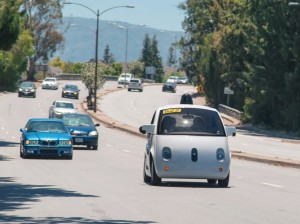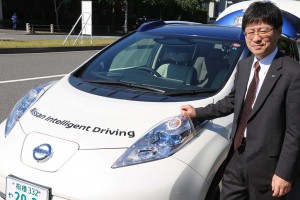
While the first autonomous vehicles are only expected to reach production by 2020, a new study forecasts they will catch on fast, with as many as 20 million of them likely to be operating on roads around the world by the middle of the next decade.
That said, the new study by Britain’s Juniper Research emphasizes that even by 2025, self-driving vehicles will represent less than 1% of the vehicles in use around the world. And that raises serious flags, industry analysts warning that things could get bumpy in the first years the technology is in use.

“The research noted that concerns over the decision making capabilities of these systems have been raised and questions have been asked about the decisions autonomous vehicles would take when presented with…two disastrous outcomes,” stated a summary of the new Juniper study.
The first semi-autonomous technologies are just going into use, Tesla Motors releasing its new AutoPilot feature earlier this autumn. The system allows motorists to drive hands-free on well-marked, limited-access roadways. Cadillac, Mercedes-Benz, BMW and Nissan are among the makers planning similar features in the next few years. And that Japanese maker promises to have it first fully autonomous model in production sometime in 2020.
(50 year later: Nader’s “Unsafe at Any Speed” may have helped save 3.5 mil lives. Click Here for more.)
Nissan CEO Carlos Ghosn has made it clear that his company intends to be a leader in the emerging field, though the new Juniper Research study doesn’t include it among what it declares the “five most promising players in the driverless car sector.” Its list includes Volvo, Daimler, Tesla and Apple, with Google in the lead spot.

That list is significant for a number of reasons. First, only two of the names, Volvo and Daimler, are traditional automotive manufacturers. Tesla is a relative newcomer to the business, and neither Apple nor Google have ever produced cars. Apple hasn’t even confirmed it is working on an autonomous vehicle, or any vehicle at all for that matter, though it has been hiring a lot of industry veterans.
As for Google, Jupiter says it “was ranked as the most promising player having been in development the longest and having logged the highest amount of autonomous miles on public roads.”
(World’s first autonomous vehicle race series set to debut in 2016. Click Here to learn more.)
But Google’s extensive and ongoing test program also highlights some of the many concerns raised about autonomous technology, especially as it slowly blends into a world where most vehicles will continue to be manually controlled for decades to come.
Google this past month reported yet another minor crash of one of its prototypes. And, as with the more than a dozen earlier incidents, this one was blamed on the other, human driver. At a stoplight, the Google Car crept forward, preparing to make a legal turn on red. But its sensors detected a potential problem and the car stopped. The driver behind didn’t.
In some of the other crashes, the Google Cars decided to stop, rather than proceed through a yellow light. The drivers behind were hoping to run the lights and, again, didn’t stop in time.
At the Connected Car Expo at the Los Angeles Auto Show last month, a number of speakers raised concerns about the challenges of integrating autonomous vehicles, programmed to strictly obey the rules of the road, with cars driven by humans who are often willing to bend the rules to save a few moments.
Google officials have acknowledged the need to revise their software to function a bit more like humans under such circumstances.
But there are other issues, notably the so-called “Trolley Problem.” In classic terms, this thought problem poses the idea of a runaway trolley barreling down the tracks. If given the choice, do you flip a switch that sends it off into a different direction, killing one person instead of three?
With an autonomous vehicle, how do you program it to handle an emergency where, for example, it might have to choose between hitting pedestrians, including an infant in a stroller, or driving off the road and killing everyone in the vehicle?
“I’m not sure we’re quite ready” to put autonomous vehicles on the road, yet, said former NHTSA Administrator and safety advocate Joan Claybrook.
On the other hand, her successor, current NHTSA boss Mark Rosekind, believes the technology could help lead to an era of near-zero traffic deaths.
Barring some sudden setbacks, the proponents seem to be in the driver’s seat when it comes to self-driving cars.
(Click Here to see what it’s like riding in an autonomous vehicle in Tokyo traffic.)








I’ll take that bet on 20 million AVs on the roadways by 2025. I’ll also take the bet that AVs will not reduce accident deaths to “near-zero”. These are pie-in-the-sky claims that are simply not supported by science nor anything else. If you had 100% AVs on the roadways you still could not reduce accident deaths to “near zero”. There will be a lot of back peddling when the talking heads have to deal with reality. You aren’t likely to have 100% AV without driver control for at least four decades or more.
BTW, I am not opposed to AV’s at all as they have a useful place in personal transportation. Trucks could also benefit from AV tech. It will be a long, long time however before AVs become more than a promised tech used by the minority of commuters. I do oppose a rush to market mentality on AVs that will result in unnecessary deaths instead of reducing deaths. With properly designed, manufactured, inspected, licensed and maintained AVs a lot of good could be achieve.
Let’s just say, GT, that I remain a “skeptical proponent” of AV technology, as with battery and hydrogen power.
Paul E.
I’m not skeptical at all about AV technology… I am however deeply concerned about the rush-to-market mentality that many embrace, which is certain to result in injuries or deaths. Hydrogen has a good future, is viable and likely to succeed while battery powered vehicles are likely to go by the wayside because of their impracticality, slow recharging rates, limited recharging stations, limited range, premium price.
I’m hoping that the AV’s work out fine because I’m one of those people that will be getting to the point in about ten years to where it will be time to give up my keys and there are millions of more baby boomers like me. Just think for a moment just how much of your freedom and independence lose if you couldn’t drive anymore. The AV’s will let millions of older people keep their freedom and independence and be able to stay in their homes longer.
Yes properly designed, manufactured and maintained AVs could bring many benefits to society. The rush-to-market mentality of many however so that they can cash in, is of deep concern to anyone who understands the technical challenges, which are many. The programmers also need to decide who will die in an unavoidable collision… The legal community will need to agree on that before any AVs are allowed on the roadways as there will be no driver to take control when the AV’s computers crash and must be rebooted or when the AV is hacked or when an input sensor fails. So yes AV’s have the potential to improve society but if allowed to continue undeterred, the rush-to-market insanity will see many people die because some gold diggers failed in their product design, manufacture or vehicle maintenance. AV’s need to employ redundant, failsafe designs with appropriate limp modes for when the AV goes tits-up. AV maintenance and licensing needs to be like the FAA’s requirements for commercial aircraft where certified techs handle all repairs and everything is documented. You won’t have a “pilot” to correct for a systems failure on an AV.